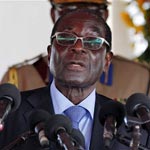
ZIMBABWE’S military remains a vital cog in President Robert Mugabe’s stranglehold on power, and will have a major say on who takes over after Mugabe’s reign, analysts and ruling party officials have said.
Richard Chidza
Some analysts said the ambitious nature of a number of Zimbabwe’s security chiefs, some of whom were strengthening their academic standing, could be a sign that they were pre-occupied with issues of power.
Political analyst Pedzisayi Ruhanya concurred with the assertions that the military would want one of their own to take over during the post-Mugabe set-up.
“The military made their position clear on the eve of the 2002 presidential election when they indicated that the office of the presidency is a straight jacket and that anyone without liberation credentials will not be acceptable to them. This means that both within and outside Zanu PF, the securocrats prefer to be led by a person with liberation values, customs, history and credentials,”Ruhanya said.
On the eve of the 2002 presidential elections — the country’s military top-brass, fronted by then Defence Forces Commander Vitalis “Shebba Gava” Zvinavashe — issued a chilling televised statement pointedly warning citizens against voting for anyone other than Mugabe.
“We wish to make it very clear to all Zimbabwean citizens that the security organisations will only stand in support of those political leaders that will pursue Zimbabwean values, traditions and beliefs for which thousands of lives were lost …
“Let it be known that the highest office in the land is a straight jacket whose occupant is expected to observe the objectives of the liberation struggle. We will therefore not accept, let alone support or salute, anyone with a different agenda that threatens the very existence of our sovereignty, our country and our people,” the late Zvinavashe said.
- Chamisa under fire over US$120K donation
- Mavhunga puts DeMbare into Chibuku quarterfinals
- Pension funds bet on Cabora Bassa oilfields
- Councils defy govt fire tender directive
Keep Reading
Ruhanya added that the country’s securocrats were likely to “block” anyone they thought would not fit their criteria.
Academic and publisher Ibbo Mandaza said Mugabe’s long stay in power could be attributed to his control and relationship with the military.
“The military is at the heart of the country’s politics and an integral part of the succession issue. Mugabe has stayed, or in the eyes of others, overstayed, because of the nature and make-up of the securocracy,” Mandaza said.
Zimbabwe National Liberation War Veterans Association chairman and minister responsible for the welfare of the former fighters, Christopher Mutsvangwa confirmed this analysis and theory in an interview with The Standard last week.
“You do not as young people fight for power and then get divorced from it because remember, we are idealistic. We saw a certain future for Zimbabwe and that is why we were prepared to sacrifice the only life we had,” he said.
“It would be out of character if we were not going to be interested because it means our sacrifice would have been in vain. We will always be pre-occupied with [issues of power].”
Afghanistan-based analyst Maxwell Saungweme said Mugabe had repaid the military’s support through a patronage system that had seen a complete militarisation of State and quasi-State institutions.
“Every public institution that has a bearing on elections and the power matrix is ‘securitised’ and militarised. This explains why you have war veterans and generals in ZEC, ZBC, police, GMB, prisons, Attorney General’s offices,” Saungweme said.
He added: “The likes of Grace [First Lady] have an outside chance due to personality cultism in the party and Mugabe’s name. So even if someone without war credentials gets the top job, they would need to have the blessings and support of securocrats. Their consistency in saying they won’t support (MDC-T leader Morgan) Tsvangirai as president does not mean they won’t support the likes of Grace to get the top job. It’s all political banter. But, they will have a say on who picks up the pieces after Mugabe.”
Human Rights Watch senior researcher Dehwa Mavhinga, however, said the military had been politicised and might not be as powerful in a post-Mugabe era.
“The military is a big factor in politics because of high politicisation, but without Mugabe, they are not that powerful. What is clear is that Mugabe wishes to die in office,” he said.
“After that, everything is up for grabs and in that scenario Zanu PF is likely to end with Mugabe. The successor to Mugabe is likely to be a person currently outside the ruling party”.











